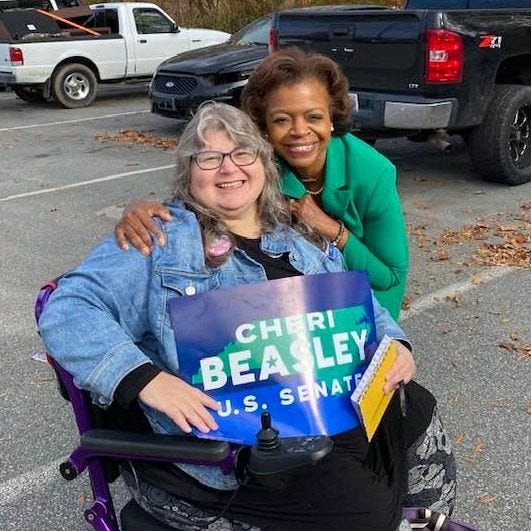Changing the World from Home
Virtual phone banks are an invaluable tool--People with disabilities join the effort to elect Democratic candidates and strengthen democracy
Pamela Kelly McAfee, a longtime activist, points out that anyone can become disabled at any time, temporarily or permanently. Instead of wondering, “What is "wrong" with that person?”, she asks that we become proactive, asking: “What barriers are volunteers and voters confronting and what are some ways to provide access?”
By Pamela Kelly McAfee
We are four years removed from the Pandemic Lockdown. As the world shut down, many struggled with isolation. On the other hand, my world suddenly became alive, bustling, and crowded. After years spent working and living online I found myself welcoming others into a new shared reality. I am a person with disabilities, just one member of the largest and most intersectional voting bloc in the US.
The year 2020 was the peak of the pandemic, and a crucial election year. Activists had to find new ways to Get Out The Vote and cure deficient ballots. The first Zoom-based phone banks were clunky. Faces of bewildered newcomers to Zoom abruptly disappeared as they dropped out in frustration. "We are building the plane as we are flying it," was the motto. What airplane can fly without a crew? I put my skills to use and began helping those struggling in this new environment. I am proud to have played a part in making virtual phone banking an integral part of our wins since 2020.
Leave no volunteer behind. Investing time to help a new volunteer navigate virtual phone banking pays back exponentially. Recently, a volunteer whose first attempt at phone banking shared in an online debriefing that she had been afraid to phone bank and that she had dyslexia. I remembered taking extra time during the training to calm her fears, but I had no idea about the dyslexia.
I have to start every session with patience and remind myself that some disabilities are invisible. I have seen volunteers who struggle with social cues ask an abundance of questions that seem redundant. These volunteers might be neurodivergent, have anxiety, or another invisible barrier. I’m sad when I hear of incidents where neurodivergent volunteers are sidelined or dismissed. Remember, people with disabilities are a large voting bloc. As leaders, we should strive to make room for people with disabilities.
Though we are doing an adequate job making phone banking accessible, we could:
Offer captioning to help deaf or hard of hearing individuals during training.
Confirm that screen readers work with standard phone bank systems like Open VPB or Hubdialer for blind or low vision volunteers. Does anyone have information or experience to share?
Make events as inclusive as feasible.
Ask if participants need accommodation when we post events. Use the Mobilize section for ADA and accessibility options.
Virtual organizing has opened the door to many volunteers because it removes barriers like parking, stairs, and transit, for people with limited physical mobility. Since 2020 I have watched our community grow and thrive as we connect from around the world. As society rushes to “get back to normal," virtual phone banking continues to remain an invaluable tool. Let’s keep options like virtual phone banking and texting as options so people like me can help save the world from our homes.
Pamela Kelly McAfee is an organizer with Grassroots Dems HQ, a candidate for state representative in her conservative North Carolina district, and a founding member of REV UP NC. REV UP (Register Educate Vote Use your Power) NC is a 501c3 affiliated with the AAPD (The American Association of People with Disabilities) REV UP NC provides outreach to persons with disabilities and other communities that face barriers to voting.






Great article.
As someone who has joined the ranks of those living with disabilities over the past year, I really appreciated this article. I am a longtime activist, and am rather famous for the amount of texting I did during recent elections. My issues are low disability and diminished hearing Post brain surgery, and I find that a lot of screen time is particularly problematic. Even texting. I’m working on it though, and I shared your article, which I listened to appreciatively, with all of my activist, friends and colleagues. I also posted it on Facebook. Thank you so much.I am so grateful to be able to dictate messages.